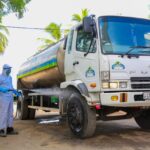DIMO, one of the leading conglomerates in Sri Lanka, has further strengthened its operations in order to expand its water infrastructure development projects locally with the government’s initiative to increase the access to the pipe-borne clean water to communities in all parts of the country. Company is also planning to expand its water infrastructure development projects business to the overseas market while leveraging the local operations.

The Comprehensive Investment & Master Plan for the water supply and sanitation sector issued by National Water Supply & Drainage Board (NWSDB) states that over 50% of Sri Lankans are provided with pipe-borne water. According to this national plan the remaining population in the country, especially those in rural areas, will benefit by receiving access to pipe-borne water. Given its extensive experience in the domain and its growing number of successful water projects, DIMO believes that there are ample opportunities to undertake water projects of any scale to help the government achieve its national development objectives.
DIMO was chosen to spearhead the local agency of KSB pumps from Germany several decades ago and has expanded to become a long-standing contractor in implementing state-of-the-art water projects for the National Water Supply & Drainage Board (NWSDB).
Today, the company has become a highly-reliable contractor that successfully executes total water projects on turnkey basis for the NWSDB by means of contributing to enhance the technology in the areas of Water Transmission, Water Treatment, Water Distribution, Automation and many others. Water projects are widely-known to be exceedingly energy consuming projects and therefore, DIMO has tapped into its expertise while collaborating with principals such as KSB to provide the best energy efficient technology to get the desired outcome through low energy consumption. This has resulted in significant savings in terms of energy usage during the long-term operations of these water projects, thereby reducing the financial burden to the nation. Ambatale Energy Conservation project, the latest and the largest Energy Conservation project of NWSDB, is one of the examples for such ground-breaking initiatives.
DIMO Chairman & Managing Director Ranjith Pandithage stated, “As our experience in water projects developed, we expanded into other areas within this domain. DIMO is accredited by the Construction Industry Development Authority (CIDA) as a C2 (for civil scope) and EM-1 (electromechanical) graded contractor for water projects, thereby making the company a qualified contractor to undertake integrated water projects in Sri Lanka. In order to further elevate our standing as a reputed and reliable contractor, DIMO aims to gain CIDA accreditation as a CS1 grade contractor for water projects in Sri Lanka while its long-term goal is to become an Engineering Procurement and Construction (EPC) contractor in water projects by 2024”.
DIMO has also been involved in executing many rural water supply schemes executed by Water Supply and Sanitation Improved Project (WASSIP) in Orubandiwewa, Galigamuwa, Kilinochchi, Nikawewa, Bulathkohupitiya, Hangliella and Maskeliya. DIMO has gone beyond completion and handing over of these projects by ensuring that these projects are operated effortlessly to cater to the general public in such rural areas. The DIMO Service Team keeps extending support in any breakdown and periodical maintenance and services of these projects anywhere in the country.
There are several criteria to be fulfilled when implementing water projects in Sri Lanka. The main aspects include fulfilling qualifications and standards, the availability of proper human resource capabilities, access to necessary suppliers, a reliable supply chain and technical expertise. With these components being fulfilled, DIMO is eligible and capable of successfully handling water projects in Sri Lanka.
On the international stage, DIMO has already initiated water infrastructure development projects in Myanmar and Maldives and is set to expand its operations in these countries. In order to prepare for the expected surge in projects, DIMO is acquiring required organisational credentials and developing human resource capabilities so that it’s well-positioned to take on any water infrastructure development project outside Sri Lanka.
ENDS



